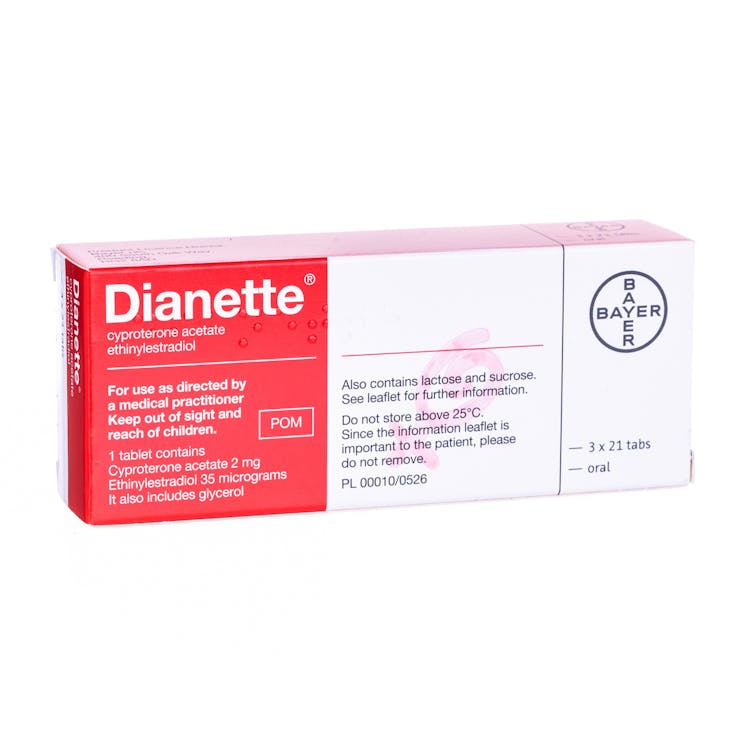Dianette
Images for illustrative purposes only
Dianette is a combined contraceptive pill. However, it is most commonly prescribed to treat acne, very oily skin and excessive hair growth in women. If you still need contraception after your skin condition has cleared up, you might be advised to use a different form of contraception.
- Protects against pregnancy
- Used to treat skin conditions like acne
- Easy to use
- Genuine medication
- Shipped from EU Pharmacies
More information
About Dianette
- Dianette is a form of the combined oral contraceptive pill
- The hormones contained within it can help to treat skin conditions including acne
- Dianette may not be suitable for you if you cannot take combined contraceptive pills
- Dianette is less frequently prescribed for contraceptive purposes only
- Dianette is the trade name, and it contains the active ingredients cyproterone acetate and ethinylestradiol
- It is important to read the patient leaflet for a full list of side effects and cautions.
How Does Dianette Work?
Oily skin and acne can be caused by the body producing too much of the hormones known as androgens. Androgens can increase the amount of sebum (a greasy substance) that the skin glands produce. The glands can then become blocked and infected, leading to flare ups of acne. These flare ups can be painful, but may also make you feel self-conscious.
Dianette contains hormones that reduce the amount of androgen the body produces. It can also reduce the effect that any remaining androgen has on your skin, helping the condition to clear up.
Dianette can also be prescribed for women with polycystic ovarian syndrome (PCOS). The hormones in Dianette help to reduce acne and any excessive facial hair, as well as helping to regulate your periods.
When taken for contraceptive purposes, Dianette works to prevent a pregnancy by preventing ovulation and making it more difficult for the sperm to enter the uterus.
How is Dianette Taken?
Dianette is taken for 21 days in a row. You should then have a 7 day break where no pills are taken.
During this 7 day break it is likely that you will have a withdrawal bleed that is like a period.
You should begin your next strip of 21 pills at the end of the 7 day break, and then keep to this 28 day cycle.
Dosage of Dianette
Dianette contains 2 milligrams of cyproterone acetate and 35 micrograms ethinylestradiol which mimic the body’s natural oestrogen and progesterone.
One tablet is taken each day for 21 days, followed by a 7 day break. This cycle then continues.
Are there any Side Effects?
Like many oral contraceptive pills, Dianette can cause some side effects.
The most common side effect is weight gain, and this is mostly due to water retention. If weight gain occurs, you will need to decide whether the benefits of taking Dianette are worth the weight gain you are experiencing.
Other common side effects include:
- Nausea (feeling sick)
- Stomach ache
- Headache
- Mood swings or low mood
- Sore breasts.
When taking a combined oral contraceptive pill, there is an increased risk of more serious complications including:
- Blood clots to the legs – seek medical advice immediately if you experience a painful, red or swollen leg
- Blood clots to the lungs – seek help immediately if you experience breathlessness, chest pain or cough up any blood
- Severe depression including thoughts of suicide – tell your doctor straight away if this occurs.
Combined contraceptives can increase the risk of breast cancer and cervical cancer. If you have a history of either of these, or have a family member who has been diagnosed with either type of cancer, then Dianette may not be the right choice for you.
If you have a severe allergic reaction (anaphylaxis) including breathlessness, lip or tongue swelling, call 999 immediately.
Dianette Warnings
Dianette is not suitable for everyone. Women who take Dianette will need regular check-ups with their doctor to check that it is not causing any harm.
In particular, Dianette may not be suitable for women who:
- Have had breast or cervical cancer
- Have a close relative who has been diagnosed with breast or cervical cancer
- Have had a blood clot
- Have a close relative who has had a blood clot
- Smoke
- Have diabetes
- Are overweight
- Have migraines
- Have sickle cell disease
- Have lupus
- Have liver disease
- Have Crohn’s disease or ulcerative colitis.
There may be other women for whom Dianette may not be suitable, and that’s why during your Consultation with EU Meds a prescriber will look at your health questionnaire to ensure you receive the best medication for your individual health requirements.
A prescriber from EU Meds will review your current medications, including any herbal remedies or supplements, to ensure that Dianette will not interact with them.
Once prescribed, you can order Dianette online for home delivery.
Buy Dianette
Buying Dianette Online
Can I buy Dianette online?
You can safely buy Dianette online at EU Meds. You will first need to have an online consultation with a pharmacist independent prescriber before your order will be supplied. The online consultation will ensure that Dianette is the right medication for your medical condition.
Do I need a prescription for Dianette?
Yes, in order to purchase Dianette you will need a valid prescription. Please note, all requests for supply of prescription medications are subject to an online clinical consultation and the decision to prescribe will be made by a doctor.

Here to help you
Our Customer Service is available Monday to Friday 9am - 4pm. If you need urgent assistance, do not use this service. Call 111, or in an emergency call 999. Visit our help section



